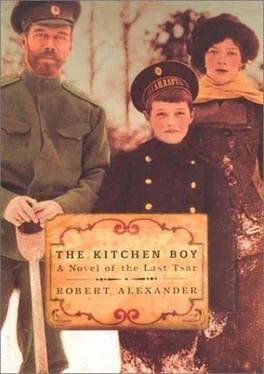Unfortunately, the day’s events soon took a turn for the worse. I was just stuffing bits of charcoal into the samovar when I heard short, heavy steps. Turning, I saw Nyuta standing there, her face flushed red, her breathing quick and short.
“Leonka, quickly – water for Yevgeny Sergeevich!”
I was constantly carrying water this way and that, but my first thought, my automatic one, was of course that something horrible had happened to the Heir Tsarevich, for all of us knew that death forever lingered in his shadow. Had Aleksei Nikolaevich fallen from his bed? Bumped his toe? Sneezed too hard? So casual an event could easily prove a mortal catastrophe for the boy, and those were the darkest of our days, actually, when the Tsarevich suffered, when we feared his end was imminent. When the blood flooded his joints, swelled his skin, twisted his limbs, the boy’s screams of pain – against which medicine was then helpless – were as piercing as a bullet. There was no escape, not for him, not for any of us, least of all the Empress, who would sit by The Little One for days on end without sleeping, without eating. She couldn’t hold her child, no, that would be too painful for him. All that she could do was kiss his brow, his cheeks, and listen in guilt as he moaned an occasional “Mummy.” Only when he was back on our side, clinging to life again, would Aleksandra Fyodorovna retire, collapsing in her own bed, from which she wouldn’t emerge for days upon end. And that was when we were called in to entertain him – the sisters, both pairs, big and little, and eventually me, of course, for only I took equal delight in the Heir’s treasures, his bits of wire, the rusty nails, as well as his prized coins, the very ones he had positioned on the train tracks back in Tsarskoye.
“Look at what Papa’s locomotive did to this kopek!” he would exclaim to me, showing the flattest of them all.
Fearing the worst for the Heir, I poured a large bowl of water, grabbed a small cloth, which I threw over my shoulder, and started quickly out. Passing through the hall in which I slept, I headed into the dining room and began to circle the large, dark oak table.
“Nyet, nyet, molodoi chelovek!” No, no, young man, called Nyuta from the doorway into the main parlor. “This way! In here!”
Confused, I came to a halt, sloshing the water from my bowl. But…? Was it not Aleksei Nikolaevich who was in need?
“Come on, Leonka! Hurry!”
I changed my direction, circled back around, and followed Demidova into the parlor, whereupon the commotion led me to the front of the room. Heading around the large, potted palm, I entered the alcove, where I saw the Empress, her second daughter, Tatyana Nikolaevna, and not Aleksei, but Dr. Botkin, who lay moaning on the reed settee that served as his bed.
“Yevgeny Sergeevich has had an attack of the kidneys,” whispered the Tsaritsa’s maid to me.
I don’t know what it says about the Empress, a woman of extraordinary complexity, but the suffering of others always brought out the best in her. From all the books I’ve read, I’ve come to understand she was horrendously insecure, pathologically so. Her friends were either totally hers and under her complete domination – for make no doubt about it, she was amazingly strong-willed – or they were simply her enemies. There existed for her nothing between those extremes of devotion and rejection. And yet when someone was in need, friend or foe, this shy woman, whose mother had perished when she was six, rallied with amazing inner strength and determination. More than anything else, she could identify with pain and suffering. In this century, however, there has been no woman more maligned or misunderstood than the Empress Aleksandra Fyodorovna, consort to the Tsar of All the Russias, just as there has been no woman whose gross mistakes – no matter how inadvertent – have hurt, even killed, so many millions. A wise woman she was not. Passionate, loving, beautiful, sure, but worldly ignorant. More damage she could not have done to her beloved adopted Russia. This scandal she caused by inviting Rasputin into the royal palace was outrageous. Imagine, while the Tsar was off fighting the Germans that stupid yurodstvo , holy fool, was all but signing imperial decrees.
Well, Aleksandra Fyodorovna placed a glass thermometer between Dr. Botkin’s lips, then turned to me and beckoned, “Leonka – the water, please.”
And then as I stood there the Tsaritsa bathed the doctor’s big, red face, wiping it gently, even professionally, you might say. After all, Aleksandra Fyodorovna and her older daughters, the big pair, Olga Nikolaevna and Tatyana Nikolaevna, became nurses soon after the outbreak of the Great War. Daily they went to the wards and the surgery theaters. Many noble women of Peterburg thought it outrageous that an Empress would bloody her hands, quite literally. Many gossiped that their Tsaritsa was wasting her efforts on a few soldiers, many of whom she befriended, many of whom died, when she should be sweeping through as many hospitals as possible, making herself seen as widely as she could. But my mistress was of the strongest conviction otherwise. She was Matushka , the Dear Mother. There were those in dire need. She had to do whatever it took, even the lowliest work, and she was often seen carrying away amputated arms and legs and worse.
Aleksandra Fyodorovna checked the thermometer, and said, “Thirty-eight point eight. Not good. The pain persists, Yevgeny Sergeevich?”
“Da-s,” weakly replied the doctor.
“Then I believe an injection is called for. Am I right?”
He nodded. “Would you… would you be so kind?”
The Tsaritsa turned to her number two daughter. “Tanechka, prepare me a syringe of morphia.”
“Certainly, Mama.”
“Nyuta, Leonka – you are excused.”
“Da-s,” replied Demidova, backing away.
I likewise muttered, bowed my head, and retreated. Glancing back once, I witnessed Tatyana Nikolaevna confidently pulling a glass syringe from the doctor’s brown leather bag.
Breakfast that morning was served not too terribly late. We had our morning inspection and then we served the morning tea and bread. Everyone was gathered there in the dining room except Dr. Botkin, who was resting more comfortably, and Aleksandra Fyodorovna, who remained by his side for the rest of the morning.
The early drama thus melted into our routine. The Tsar paced the dining room. The girls made their beds, then the older pair started reading, while the younger girls came and sat at the dinner table and began to draw. I wheeled about the Heir. Cook Kharitonov fussed in the kitchen over our meager provisions, and Demidova and Trupp emptied the enamel chamber pots employed for night use. Our morning walk in the garden was scheduled for half-past ten, and we all anticipated this silently but with great urgency.
Just as the day before, however, the doors were suddenly and unexpectedly thrown open. It happened at ten precisely, and this time it was but two men, neither of whom we had ever seen, who marched into our world. I was just wheeling the Heir around the dinner table when they stormed in, proceeding directly past their former master as if he were a stupid dog. I pulled the wheeling chair to a quick stop, and both Aleksei Nikolaevich and I watched as they continued through the room. They carried not guns or grenades, but tools, entering the girls’ room in utter silence, for all visitors to The House of Special Purpose were under strict Red orders not to speak with us.
Raising his right hand, the Heir bid me forward, and I rolled him thus, creeping around the table, past the chairs. And then, like the Tsar himself, who came up behind us, we cautiously peered through the doorless opening. Several of the grand duchesses sat on their beds, and we were all transfixed as the men quietly but surely set to work on one of the windows. It took but moments, and as we witnessed the seemingly unbelievable, I saw the Tsar’s brow rise in surprise, witnessed the dumbfounded shake of his head, received the thrilled wink of his eye. Da, da , the two workmen did the impossible: they unglued a single, wonderful, beautiful window.
Читать дальше












